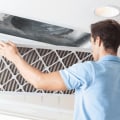The operation of an air conditioner circulates indoor air, removes heat, and also filters some particles from the air. If you want to make sure your air filtration works at peak efficiency, get the highest level of filters you can. An air conditioner doesn't work like an air purifier, although some may filter smoke a little. Don't try to use them as air purifiers.
In addition, you should be responsible for using your air conditioner properly to prevent premature deterioration. The short answer to the question is yes. If the area you live in is prone to wildfires, you can prepare properly before the season starts. One of the routes you can take is to purchase a high-quality portable air filter or HVAC filter.
If you choose to go for the latter, make sure it has a high Minimum Efficiency Report Value (MERV) rating, generally greater than ten. The higher the number, the better the filter for removing contaminants. Filters also range in thickness from one to five inches. Try to change the filter more often during wildfire season, as they can get dirty faster than usual.
Today, it is common knowledge that cigarette smoke is very harmful to the health and health of people who breathe other people's smoke. As if increased health risks and premature death weren't enough, they also affect the effectiveness of an air conditioner and the air quality in a smoker's home. Cigarette smoke contains what are known as gaseous pollutants, which are small enough to be inhaled and attach to the lungs. Some of these harmful chemicals include carbon monoxide, ammonia, arsenic, benzene, and hydrogen cyanide.
Of the 250 chemicals commonly found in cigarettes, at least 70 are known to cause cancer. But not only do these contaminants attach to your lungs, but they stay in your home and make the air less healthy to breathe. While air conditioners have filters designed to improve indoor air quality, the amount of contaminants released by a cigarette is so substantial that it quickly coats an air conditioning filter with debris. Filters must be changed at least once a month - and depending on how many cigarettes you smoke a day or how many smokers live in the house, you may need to change them even more often.
It's important to note that just because filters get dirty faster doesn't mean they're trapping all the chemicals discharged from cigarettes - some of these chemicals include arsenic (yes, like what is found in rat poison), ammonia, butane, carbon monoxide, formaldehyde, lead, tar, and benzene (usually also found in rubber cement). An air filter can only do so much. If there is a need for indoor smoking, a healthy alternative for you and anyone in the house is to use an electric cigarette. They do not produce harmful smoke and can provide the user with the necessary nicotine.
The water vapor produced from an electronic cigarette doesn't stick to anything like normal smoke does - your air conditioning unit will perform better and you won't have to change filters as often. There is no such thing as an air conditioning filter for smokers - however, if you don't plan to quit smoking, you could reduce cigarette smoke pollution by also installing a HEPA filter in your air conditioner. The reason they are so beneficial is that they trap air pollutants that other air filters normally don't trap - this includes some (but not all) tobacco contaminants. While it's only a temporary solution, opening a window can help displace tar-filled air - especially if you live in a remote area.
By working similar to a blood transfusion in the human body, a burst of fresh air from outside will replace stagnant air and contaminants it might contain. Of course, if all you take is a big blow of car exhaust every time you go out, this might not be the best idea - the longer the windows are open, the better the results - just don't turn on the air conditioner while doing this. Regular preventive maintenance of the air conditioner is important - whether a person smokes or not. However, if you like lighting up cigarettes your air conditioner and air ducts will have significantly more pollutants than the average home - this can make your air conditioner less efficient and reduce its lifespan.
By scheduling maintenance checks an HVAC technician can anticipate problems before they affect the mechanics of your air conditioning system - they can also let you know if you should change filters more often based on the amount of debris found inside the unit. If you have an air conditioning unit, you will have some type of filter - however these types of filters cannot trap smoke particles. We recommend talking to an HVAC technician to identify the most efficient filter for your particular system - medium MERV filters provide much more filtration than basic MERV 1-4 filters with central air systems which capture only visible to the naked eye contaminants such as pet hair and dust rabbits but not fine particles such as smoke. Air conditioners cannot filter cigarette smoke and it will affect the life of its filter - we all know that air conditioners have air filters to treat this type of dust and other particles but particles in cigarettes are so heavy that they can cover an entire filter with debris in just a few days.
Additional information on portable air filters and HVAC filters can be found in EPA's indoor air filtration fact sheet and Home Air Filter Guide - EPA recommends filters with a rating of at least MERV 13 or “as high as system filter and fan slot can accommodate”. You may need to consult a professional HVAC technician to determine highest-efficiency filter that works best for your system - you may decide to purchase a portable air cleaner or high-efficiency HVAC system filter as part of your preparation to help improve indoor air quality during wildfire smoke event.


